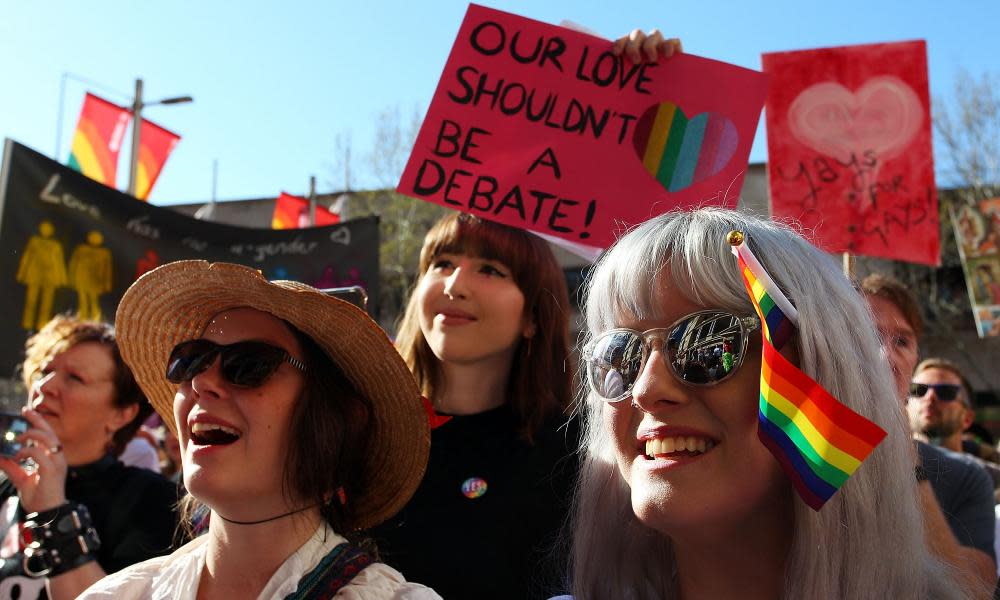Marriage equality voter turnout may leave campaigns chasing diminishing returns

If you’ve heard quite enough about marriage equality for one lifetime consider these statistics: the Guardian Essential poll finds that 36% of people have already voted and the yes campaign believes it is even higher, that a majority of Australians have already had their say.
With two weeks down and six weeks to go in this eight-week marathon, it seems most people have made up their minds and what remains of the campaign will be a long, unrewarding grind to the finish line.
At the start of the campaign there was a slight poll drop that marriage equality supporters attributed to an expected tightening in the race because the survey period gives equal airtime to scare campaigns.
Despite the wobble, the Equality Campaign did not change course and fight on its opponents’ issues, even as a conga line of conservatives lined up to tell people to vote on free speech, boys in dresses, freedom of religion, Safe Schools, political correctness, whether you like the way the country is going and finally whether Australians approved of the alleged head-butt of the former prime minister Tony Abbott.
The Equality Campaign’s executive director, Tiernan Brady, said that Australians “have seen through the misdirection and the white noise”.
“They know it’s a straightforward question about a very simple matter: should lesbian and gay people been treated equally by the law of the land,” he said.
The Guardian Essential poll shows supporters of marriage equality outnumber opponents 58% to 33%, dominate among Australians who have already voted (72% to 26%) and are more likely to vote.
The poll finds 88% of yes voters have voted or will definitely vote compared with 80% of no voters. If that was born out in the survey, it would translate to a 66% to 34% win for marriage equality.
Brady said the numbers are “undoubtedly really good” but the yes campaign is “in no way complacent”.
“We know that the Australian people are for marriage equality and have been for many years but for that value to be reflected in the result of the survey everybody needs to vote.”
GetUp data analyst Ben Raue told Guardian Australia that as of Monday the yes campaign had made 530,000 calls, resulting in 41,000 meaningful conversations. It has knocked on more than 100,000 doors.
About 170,000 people clicked through to the voteyes.org.au website after a text message urging Australians to “help make history and vote yes for a fairer Australia”.
Despite initially being outspent five-to-one in free-to-air television advertisements, the yes campaign has almost caught up, spending $855,000 in TV radio and print ads compared with $998,000 by the no campaign, according to new statistics from the market analytics firm Ebiquity.
The Equality Campaign and supporters such as Tanya Plibersek are right to warn against complacency but the polls would have to be very wrong about whether and how Australians are voting if the no campaign is to win.
The Equality Campaign will continue to turn out the vote, despite its internal polling and other sources including door-knocks and phone calls suggesting that a majority of Australians have already voted.
But with a diminishing pool of Australians still to cast their ballots, the yes campaign can afford to fight for the hearts and minds of soft supporters and undecided voters.
A new ad from the Equality Campaign is instructive:
This is about fairness. Treating everyone the same.
And that's all it's about.#PostYourYES: https://t.co/jmlYeoyuw7 pic.twitter.com/IM54C1Mpdb— AU Marriage Equality (@AMEquality) September 24, 2017
“We’ve always taught them how important it is to be fair ... That’s what this marriage equality thing is all about: fairness, treating everyone the same,” says the mother.
“And that’s all it’s about,” adds the father in tones that the yes campaign hope will put to bed claims the survey is a referendum on “gender fluidity”.
The first period of the campaign was all about getting out the vote. There is now a shift, albeit a small one, to addressing and dismissing the litany of extraneous issues introduced by the no campaign and ensuring that soft yes voters are not deterred and undecideds do not break towards the no camp.
Of greater concern is that with the finish line in sight the no camp will get increasingly desperate. Homophobic material, much of it still unauthorised despite the new safeguards law, continues to circulate.
In one of the ugliest episodes yet, posters of the neo-Nazi group Antipodean Resistance were found at the University of Tasmania on Monday. The posters cited the high rates of attempted suicide among gay and trans people and actively encouraged suicide.
A spokesman for Just Equal, Ivan Hinton-Teoh, said Australians “need to do better to counter that fear and call it out for what it is” and it should not be left to the yes campaign to call out such material.
The posters were condemned by the Tasmanian senator Eric Abetz, who just days earlier had used the alleged assault of Abbott to claim intolerance in the debate had “overwhelmingly been one-way traffic”. The alleged head-butter denied he had confronted Abbott over his views on marriage.
There is no evidence to suggest Australians are deciding their vote based on violent conduct or abusive material at either extreme of the debate.
The yes campaign is convinced that people are voting in large enough numbers that it can carry the day with its ground game and maintain the focus on equality while taking its opponents head on when they try to misdirect the debate.
They will chase every last vote but there may be diminishing returns until the 7 November finish line.

 Yahoo News
Yahoo News 
